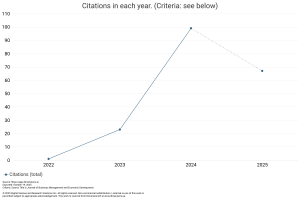Effect of Supervision on Performance Employees at Regional Technical Implementation Unit (RTIU) Senaken Penyembolum Market, Paser District
DOI:
https://doi.org/10.59653/jbmed.v2i02.792Keywords:
Supervision, Employee Performance, Technical ImplementationAbstract
The aim of this research is to determine the effect of supervision on employee performance at the Regional Technical Implementation Unit (RTIU) Pemembolum Senaken Market, Paser Regency. From the results of the validity test, all 10 statement items were declared valid because they were greater than the rtable value of 0.2006 for each statement in this study. From the results of the reliability test, a value of 0.959 was obtained, which means there is a very strong relationship between the independent variable and the dependent variable. From the results of multiple linear regression analysis, it can be seen that the results of the regression equation are Y = 40.597 + 0.535X1 + 0.361X2. Based on the calculation results, an R value (Correlation Coefficient) of 0.915 is obtained which is at an interpretation level between 0.80-1.00, which means that there is a very strong influence from the supervision variable (X) which consists of direct supervision (X1), and supervision. indirectly (X2), on employee performance (Y). The value of the Adjusted R Square Determination Coefficient (????2) is 0.833 or 83.3%. These results show that 83.3% of the direct supervision variables (X1) and indirect supervision (X2) have had an influence on the employee performance variable (Y). The remaining 16.7% is influenced by other unknown variables. From the results of the F test carried out, the supervision variable (X) consists of direct supervision (X1) and indirect supervision (X2), together they have an influence on employee performance. This is proven by the Fcount result of 238.507 with a significance level of 0.000, which means it is greater than Ftable 3.09. The results of the t test showed that the t-count value of direct supervision (X1) was 5.646 with a significant level of 0.000 and the t-count value of indirect supervision (X2) was 3.637 with a significance level of 0.000. Of the two independent variables studied, it is known that the direct supervision variable (X1) is the variable that has the dominant influence on employee performance (Y). This is proven by the results of direct supervision (X1) > indirect supervision (X2) or (5.646 > 3.637) so H0 is rejected and Ha is accepted.
Downloads
References
Adamy, Marbawi. 2016. Manajemen Sumber Daya Manusia. Cetakan Pertama. Ljokseumawe: Unimal Press
Amri., Syaiful. Et.Al. 2022. Pengantar Ilmu Manajemen. Cetakan Pertama. Nusa Tenggara Barat: Seval Literindo Kreasi
Amruddin., Et.Al. 2020. Pengantar Manajemen (Konsep Dan Pendekatan Teoritis). Cetakan Pertama. Bandung: Media Sains Indonesia
Arikunto, Suharsimi. 2014. Prosedur Penelitian Suatu Pendekatan Praktik. Cetakan Kelima belas. Jakarta: RINEKA CIPTA
Feriyanto, Andri dan Triana, Endang Shyta. 2019. Pengantar Manajemen (3 In 1) Untuk Mahasiswa Dan Umum. Cetakan Pertama. Yogyakarta: Pustaka Baru.
Firmansyah, M. Anang dan Mahardika, Budi W. 2018. Pengantar Manajemen. Cetakan Pertama. Yogyakarta: Budi Utama
Harwina, Yulia. 2022. Pengaruh Pengawasan Terhadap Kinerja Karyawan Pada PT Perkebunan Nusantara V Pabrik Palm Karnel Oil TandunRokan Hulu. Jurnal Ekonomi dan Bisnis. (Online). Vol.13, No. 3
Hodi. 2022. Pengantar Manajemen. Cetakan Pertama. Yogyakarta: Budi Utama
Kasmir. 2019. Manajemen Sumber Daya Manusia (Teori Dan Praktik). Cetakan Keenam. Depok: Raja Grafindo Persada
Kawiana, I Gede Putu. 2020. Manajemen Sumber Daya Manusia “Msdm” Perusahaan. Cetakan Pertama. Bali: (Unhi) Press
Mangkunegara, A.A. Anwar Prabu. 2017. Manajemen Sumber Daya Manusia Perusahaan. Cetakan Keempat Belas. Bandung: Remaja Rosdakarya
Mulyadi, dan Winarso, Widi. 2020. Pengantar Manajemen. Cetakan Pertama. Jawa Tengah: Pena Persada
Nora, Yulia. 2009. Pengaruh Pengawasan Langsung dan Tidak Langsung Terhadap Kinerja Pegawai Rektorat Universitas Mulawarman Samarinda. Skripsi. Samarinda: Universitas Mulawarman
Nugraha, Heppy Hariadi. 2019. Pengaruh Pengawasan Terhadap Kinerja Pegawai Pada Dinas Pekerjaan Umum dan Tata Ruang Kabupaten Paser. Skripsi. Tanah Grogot: STIE Widya Praja
Nuryadi, Et.Al. 2017. Dasar-Dasar Statistik Penelitian. Cetakan kesatu. Yogyakarta: SIBUKU MEDIA
Priyatno, Duwi. 2010. Paham Analisa Statistik Data Dengan Spss. Cetakan Pertama. Yogyakarta: Mediakom.
Purba, Sukarman dkk. 2020. Prilaku Organisasi. Cetakan 1. Yayasan Kita Menulis.
Rahardjo, Daniel Adi Setya. 2022. Manajemen Sumber Daya Manusia. Cetakan Pertama. Semarang: Yayasan Prima Agus Teknik.
Sardimi. 2020. Pengantar Manajemen Dan Bisnis. Cetakan Pertama. Yogyakarta: K-Media
Sugiyono. 2021. Metode Penelitian Kuantitatif Kualitatif Dan R&D. Edisi Kedua. Cetakan Ketiga. Bandung: Alfabeta
Sujarweni, V. Wiratna. 2022. Metodologi Penelitian Bisnis & Ekonomi. Cetakan Pertama. Yogyakarta: Pustaka baru press
Sunyoto, Danang. 2015. Manajemen Dan Pengembangan Sumber Daya Manusia. Cetakan Pertama. Yogyakarta: Caps (Center for Academic Publsihing Service)
Syaifuddin. 2018. Motivasi Dan Kinerja Pegawai. Edisi Pertama Jilid 1. Sidoarjo: Anggota IKAPI
Wibowo. 2017. Manajemen Kinerja. Edisi Kelima. Cetakan Kedua belas. Depok: Raja Grafindo Persada
Widodo, Suparno Eko. 2016. Manajemen Pengembangan Sumber Daya Manusia. Cetakan ketiga belas. Bandung: Remaja Rosdakarya Offset
Downloads
Published
How to Cite
Issue
Section
License
Copyright (c) 2024 Nuriyah, Muhammad Akbar, Welda Widya Hidayah

This work is licensed under a Creative Commons Attribution-ShareAlike 4.0 International License.
Authors who publish with this journal agree to the following terms:
- Authors retain copyright and grant the journal right of first publication with the work simultaneously licensed under a Creative Commons Attribution-ShareAlike that allows others to share the work with an acknowledgement of the work's authorship and initial publication in this journal.
- Authors are able to enter into separate, additional contractual arrangements for the non-exclusive distribution of the journal's published version of the work (e.g., post it to an institutional repository or publish it in a book), with an acknowledgement of its initial publication in this journal.
- Authors are permitted and encouraged to post their work online (e.g., in institutional repositories or on their website) prior to and during the submission process, as it can lead to productive exchanges, as well as earlier and greater citation of published work (See The Effect of Open Access).





























